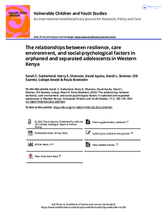The relationships between care environment, resilience, and social factors in orphaned and separated adolescents and youths (OSAY) in western Kenya are complex and under-studied. Survey responses from OSAY living in Charitable Children’s Institutes (CCI) and family-based care settings (FBS) in Uasin Gishu County, Kenya were used to examine the associations between 1) care environment and resilience; 2) care environment and factors thought to promote resilience (e.g. social, family, and peer support); and 3) resilience and these same resilience-promoting factors, using multivariable linear and logistic regressions.
This cross-sectional study included 1202 OSAY (50.4% female) aged 10–26 (mean = 16; SD = 3.5). The mean resilience score in CCIs was 71 (95%CI = 69–73) vs. 64 (95%CI = 62– 66) in FBS. OSAY in CCIs had higher resilience (β = 7.67; 95% CI = 5.26–10.09), social support (β = 0.26; 95%CI = 0.14–0.37), and peer support (β = 0.90; 95%CI = 0.64–1.17) than those in FBS. OSAY in CCIs were more likely to volunteer than those in FBS (OR = 3.72; 95%CI = 1.80–7.68), except in the male subgroup. Family (β = 0.42; 95%CI = 0.24–0.60), social (β = 4.19; 95%CI = 2.53–5.85), and peer (β = 2.13; 95%CI = 1.44–2.83) relationships were positively associated with resilience in all analyses. Volunteering was positively associated with resilience (β = 5.85; 95%CI = 1.51–10.19).
The factor most strongly related to resilience in both fully adjusted models was peer support. This study found a strong relationship between care environment and resilience. Care environment and resilience each independently demonstrated strong relationships with peer support, social support, and participating in volunteer activities. Resilience also had a strong relationship with familial support. These data suggest that resilience can be developed through strategic supports to this vulnerable population.

